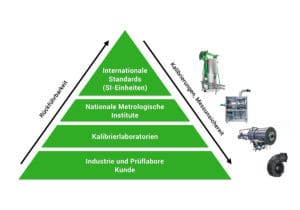Calibration laboratories
National and international standards, flow calibration
Realizing and passing on the legal units of volume (m³) and flow (m³/h) or mass (kg) and mass flow (kg/h) of flowing gases is one of our tasks!
EPE is responsible for the feedback of the “volume” and “mass” or “flow rate” of flowing gas to the basic units of the SI system. For this purpose, standard piston test stands (5 cm³/h to 3 m³/h), gas measuring bells (1 m³/h to 250 m³/h) and nozzle test benches (up to to 10,000 m³/h) are available. All calibrations therefore use references and procedures that trace the measured variables back to national and international standards and the SI unit system. We offer quick calibrations both in our fixed laboratory and on-site at our customers. This avoids unnecessarily long downtimes due to disassembly, transport, calibration and reinstallation. The calibration laboratory is a member of the German Calibration Service (DKD).
Standard measuring devices
- Bell Prover
A gas measuring bell serves as the primary standard, with which volume flow rates of air at atmospheric pressure are shown with a measurement uncertainty of up to 0.06% (k=2).
- Piston Prover
Several standard piston devices of different principles allow the calibration of gas measuring devices with a measurement uncertainty of up to 0.12% (k=2).
- Nozzle test benches
The series of SMF® nozzle test benches was specially developed for calibration with air with a measurement uncertainty of up to 0.15% (k=2). Critical nozzles are used as measuring elements. Depending on customer requirements, up to 18 critical nozzles can be combined.
- HPPP480 High Pressure Piston Prover
The system consists of the pipe test section as a primary standard, critical nozzles for flow stabilization and as a secondary standard, and turbine wheel gas meters as reference standards (measurement uncertainty up to ≤ 0.07% (k = 2)).
Traceability to national measurement institutes
In order to constantly develop the latest standards and measurement methods, we are researching new paths in measurement and testing technology for gases and liquid media with partners from science and teaching, and maintain close cooperation with the Physikalisch-Technische Bundesanstalt (PTB) in Braunschweig.


